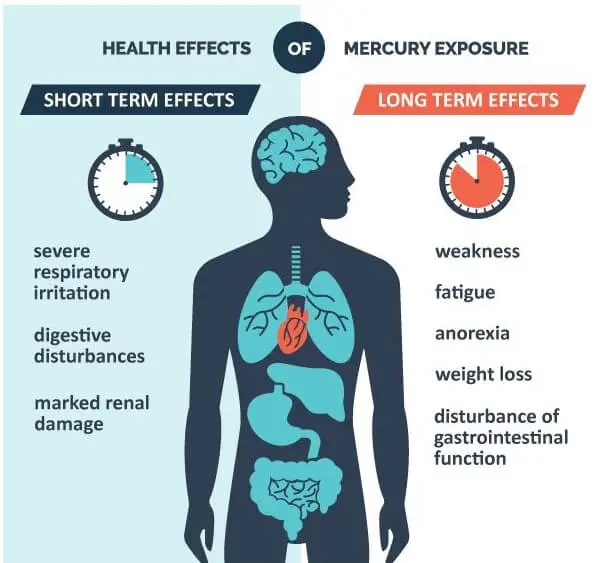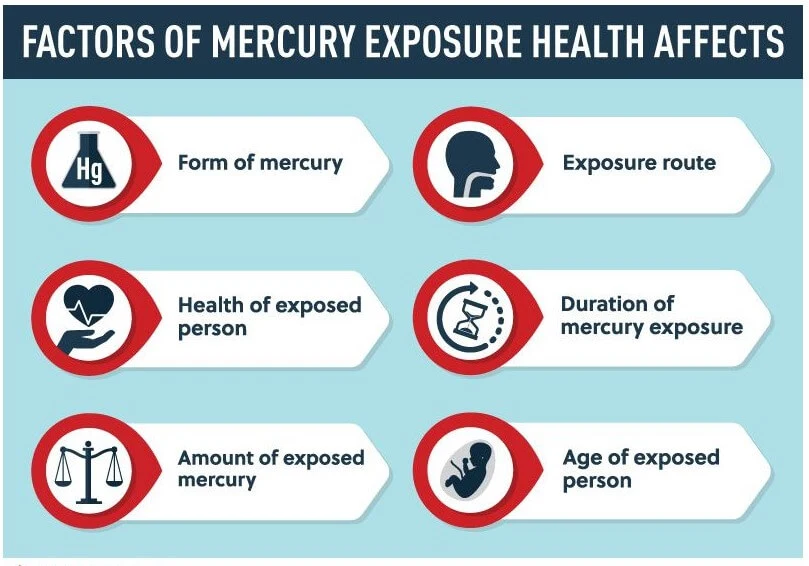Navigating the complexities of mercury exposure, its side effects, and the myriad health implications, this guide provides a comprehensive overview of this potent neurotoxin. Renowned for its unique silver liquid state, Mercury has found wide-ranging uses across industries, from medical applications to manufacturing processes. However, mercury’s toxicity can lead to significant health issues despite its various applications. This blog delves into the types of mercury that can potentially cause toxicity, the symptoms of mercury poisoning, and the health problems that can result from exposure. Understand the elemental, inorganic, and organic forms of mercury, and become informed about how to prevent and treat mercury exposure.
Mercury
Mercury is a chemical element with the symbol Hg and atomic number 80. It is often known as quicksilver due to its appearance as a shiny and silvery liquid at room temperature. This makes it unique, as it is the only liquid metallic element under standard temperature and pressure conditions.
Mercury occurs in deposits worldwide, often as mercuric sulfide or cinnabar. It has several uses in various industries. It’s used in thermometers, barometers, and other scientific instruments, although this usage has declined with the rise of safer alternatives due to mercury’s toxicity. Mercury compounds have been used in medicine, and it is also used in some electrical switches and relays.
Mercury forms useful compounds with other elements. Mercuric chloride (corrosive sublimate) was once used to treat syphilis, and mercuric chloride (calomel) is used as a standard in electrochemical measurements and medicine as a purgative.
In terms of its physical properties, Mercury is a dense, poor conductor of heat but a fair conductor of electricity, and it has a freezing point of −38.87 degrees Celsius and a boiling point of 356.73 degrees Celsius. Mercury has been known since ancient times. The alchemists believed mercury to be the first matter from which all metals were formed.
Despite its useful properties, mercury and its compounds are highly toxic and should be handled carefully. They can be absorbed through the skin and mucous membranes, leading to mercury poisoning and severe neurological and kidney damage.

Mercury Side Effects – Different Mercury Effects On The Body
Mercury is a potent neurotoxin that can have serious effects on your health, whether it’s inhaled, ingested, or comes into contact with the skin. Three types of mercury can potentially cause toxicity: elemental mercury, inorganic mercury, and organic mercury, with the latter often in the form of methylmercury, posing a significant risk if consumed in large amounts, particularly through certain types of seafood.
Here are the potential side effects of each form of mercury:
- Elemental Mercury (also known as Metallic Mercury): This liquid form of mercury can vaporize in room-temperature conditions. It’s found in some thermometers, dental fillings, and batteries. Breathing in air containing elemental mercury vapors can lead to health issues, including lung damage, nausea, vomiting, diarrhea, blood pressure or heart rate, skin rashes, and eye irritation.
- Inorganic Mercury is found in batteries, disinfectants, and some skin creams. If you’re exposed to inorganic mercury, it can cause stomach upset, including nausea, vomiting, and diarrhea. Long-term exposure can lead to changes in skin color (ranging from red to pink to white), vision problems, memory problems, and tremors.
- Organic Mercury (also known as Methylmercury): This type of mercury is produced by certain microorganisms in water and soil. It accumulates in the food chain, especially in certain types of fish. The most common way people in the U.S. are exposed to methylmercury is by eating fish and shellfish. High levels of methylmercury can harm the nervous system. In fetuses, infants, and children, the primary health effect of methylmercury is impaired neurological development.
Chronic exposure to any form of mercury can have more severe effects, including:
- Nervous system effects: tremors, anxiety, mood changes, memory loss, headaches, and insomnia.
- Digestive system problems: abdominal pain, vomiting, and bloody diarrhea.
- Renal damage: mercury is toxic to the kidneys and can result in kidney failure.
- Respiratory failure: high levels of mercury can damage the lungs leading to respiratory failure.
- Cardiovascular problems: abnormal heart rhythms or rates and high blood pressure.
In general, mercury exposure should be avoided due to its high toxicity. If you suspect you have been exposed to high levels of mercury, you should seek medical attention immediately.

Signs And Symptoms Of Mercury Poisoning
Mercury poisoning can cause severe symptoms and health problems. The specific symptoms depend on the type of mercury exposure:
Elemental Mercury (also known as Metallic Mercury)
This form is found in old thermometers, electrical switches, and dental amalgams and is often used in artisanal gold mining. If its vapors are inhaled — typically when mercury is heated or vaporized — symptoms can include:
- Tremors
- Mood swings, nervousness, irritability, and other emotional changes
- Insomnia
- Neuromuscular changes (such as weakness, muscle atrophy, and twitching)
- Headaches
- Abnormal sensations (paresthesia or “pins and needles”)
- Changes in nerve responses
- Poor performance on tests of cognitive function
Inorganic Mercury
This form can be ingested and is found in batteries and some disinfectants. Symptoms of inorganic mercury poisoning can include:
- Skin rashes and dermatitis
- Mood swings
- Memory loss
- Mental disturbance
- Kidney damage

Organic Mercury (also known as Methylmercury)
This is the form that people might eat in contaminated fish and seafood. It’s a particularly harmful neurotoxin, which can damage the nervous system, including the brain. Symptoms can include:
- Impairment of peripheral vision
- Disturbances in sensations (paresthesia or “pins and needles,” as well as numbness) usually in the hands, feet, and sometimes around the mouth
- Lack of coordination of movements
- Impairment of speech, hearing, walking
- Muscle weakness
In severe cases, paralysis and death can occur
In unborn babies, mercury poisoning can cause severe developmental issues, and in young children, it can affect cognitive thinking, memory, attention, language, and fine motor and spatial skills.
Mercury poisoning is a serious condition that can cause long-term and possibly irreversible neurological damage as well as damage to the kidneys. If you suspect that you or someone else may have mercury poisoning, it’s crucial to seek medical help immediately.
Conclusion
In conclusion, despite its useful applications across various industries, mercury is a potent neurotoxin with serious implications for human health. Exposure to its elemental, inorganic, and organic forms can lead to various symptoms, ranging from mood swings, insomnia, and kidney disease symptoms to severe neurological and kidney damage. Mercury poisoning is a serious condition that requires immediate medical attention.
It’s paramount to understand the risks associated with mercury, to be aware of its possible sources, and to adopt preventative measures. Education and awareness are key in mitigating the risks associated with this hazardous element.

